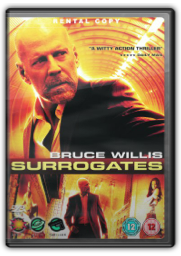
Intriguingly scaled more along the lines of a good sci-fi short story than a steroid-enhanced action picture, Surrogates proposes a variation on spectatorship-run-amok. In the near future, human beings need no longer leave their homes: mechanical surrogates, similar in appearance (but younger looking, fitter, with fewer wrinkles and more hair) can move about in the world on the user's behalf, following commands and absorbing physical wear and tear. A cop (Bruce Willis) begins investigating a mystifying case of a user who died when his surrogate got blasted by a fancy ray-gun in the street—that—that's a definite violation of the company guarantee. In the course of a trim, sub-90-minute running time, the Willis character himself is forced to enter the mean streets in his own flesh-and-blood version, not his surrogate, a move that puzzles both his wife (Rosamund Pike) and partner (Radha Mitchell). In the movie's scheme of perfect surrogates and digitally-smoothed faces, the grizzled humanity of Bruce Willis comes blazing through; what a relief to see a battered human in the midst of the beautiful people. Director Jonathan Mostow (Terminator 3) gets the world right, but one waits in vain for a fuller picture of the effects of this surrogate population, or a deeper study of the creator (James Cromwell) of the technology, or a reason to get involved in the rebel leader (Ving Rhames in a fright wig) and his reservation populated by defiant non-surrogates. Sprinting along as it does, Surrogates doesn't find time for these presumably crucial details, and the result feels a little skin-deep. —Robert Horton 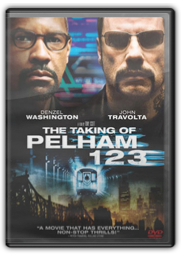
John Godey's 1973 novel The Taking of Pelham One Two Three boasts a suspense situation so surefire that even the directorial bad habits of Tony Scott can't ruin this latest movie version. Four armed men seize a New York City subway train, isolate one car, and threaten to start killing passengers if a ransom isn't paid within the hour. The ransom was a million dollars in the book and also in Joseph Sargent's solid 1974 movie, in which Robert Shaw played the mercenary leading the hostage takers and Walter Matthau was the growling transit cop trying to outsmart him. In 2009, the title has gone digital—The Taking of Pelham 123—and inflation has jumped the asking price to $10 million. Where Shaw's menace was steely, John Travolta opts for manic, and shamelessly has a blast in the master villain role. His adversary, cagily underplayed by Denzel Washington, has been upgraded in civil-service rank but also demoted on suspicion of taking a bribe. This colors the dynamics of the dialogue between Washington at his control-center console and Travolta on the motorman's microphone aboard the stalled train. 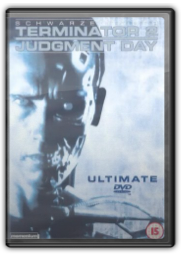
Arguably the finest movie of its kind, Terminator 2: Judgment Day captured Arnold Schwarzenegger at the very apex of his Hollywood celebrity and James Cameron at the peak of his perfectionist directorial powers. Nothing the star did subsequently measured up to his iconic performance here, spouting legendary catchphrases and wielding weaponry with unparalleled cool; and while the director had an even bigger hit with the bloated and sentimental Titanic, few followers of his career would deny that Cameron's true forte has always been sci-fi action. With an incomparably bigger budget than its 1984 precursor, T2 essentially reworks the original scenario with envelope-stretching special effects and simply more, more, more of everything. Yet, for all its scale, T2 remains at heart a classic sci-fi tale: robots running amok, time travel paradoxes and dystopian future worlds are recurrent genre themes, which are here simply revitalised by Cameron's glorious celebration of the mechanistic. From the V-twin roar of a Harley Fat Boy to the metal-crunching Steel Mill finale, the director's fascination with machines is this movie's strongest motif: it's no coincidence that the character with whom the audience identifies most strongly is a robot. Now that impressive but unengaging CGI effects have come to over-dominate sci-fi movies (think of The Phantom Menace), T2's pivotal blending of extraordinary live-action stuntwork and FX looks more and more like it will never be equalled. 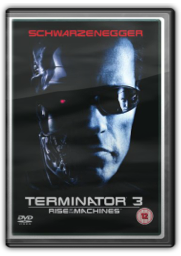
Returning for a third bout of cyborg time travelling, Arnold Schwarzenegger reprises his good-robot role from TERMINATOR 2, once again travelling back from the future to protect future human resistance leader John Connor (played this time around by Nick Stahl). We soon discover that Connor has become something of a drifter, his mother Sarah Connor has passed away, and he has taken to the road in order to preserve himself for his supposed destiny. When Connor breaks into a lab to score some painkillers, he unwittingly runs into his future belle Kate Brewster (Claire Danes), and a whole load of titanium-plated-trouble in the form of a hot female Terminator played by newcomer Kristanna Loken. Hell-bent on destroying Connor, Brewster, and anyone else that gets in her way, Loken's Terminator comes face to face with Schwarzenegger's Terminator leading to some epic battles between the two cyborgs, and a neat string of one-liners from Schwarzenegger. 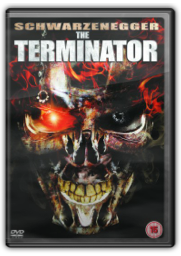
The Terminator was the film that cemented Arnold Schwarzenegger's place in the action-brawn firmament, and both his and the movie's subsequent iconic status are well deserved. He's chilling as the futuristic cyborg that kills without fear, without love, without mercy. James Cameron's story and direction are pared to the bone and are all the more chillingly effective for it. But don't overlook the contribution of Linda Hamilton, who more than holds her own as the Terminator's would-be victim, Sarah Connor, thus creating—along with Sigourney Weaver in Alien—a new generation of rugged, clear-thinking female action stars. The film's minimalist, malevolent violence is actually scarier than that of its far more expensive, more effects-laden sequel. —Anne Hurley 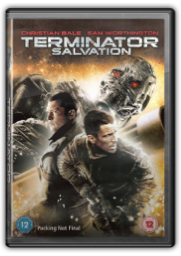
Terminator Salvation restores some of the balance of huge explosions and emotionally compelling plot to the Terminator series. Set entirely after the nuclear assault that left the computer system Skynet in control of the world, Terminator Salvation follows John Connor (Christian Bale) as he grapples with both murderous robots and his superiors in the resistance, who aren’t sure they believe the prophecies that Connor is destined to save humanity. Into the midst of this struggle tumbles Marcus Wright (Sam Worthington, who would later star in James Cameron’s Avatar); the last thing he remembers was being executed in prison decades before. Baffled, he falls into company with Kyle Reese (Anton Yelchin, Star Trek) and a mute little girl who soon get captured—but Wright then meets and bonds with Blair Williams (Moon Bloodgood, Eight Below), a resistance fighter who remains loyal to the confused Wright even though Connor suspects he’s not what he seems—or what he believes himself to be. Terminator Salvation isn’t the astonishing synthesis of action and feeling that either The Terminator or T2 were. Despite this, Terminator Salvation has at least two skillfully orchestrated action sequences that will get your heart racing, and Worthington’s beguiling mixture of toughness and vulnerability gives his relationship with Bloodgood a genuine pulse. It’s imperfect, but compared with the hollow carcasses that most action movies (including Terminator 3) turn out to be, it’s worth seeing. —Bret Fetzer |
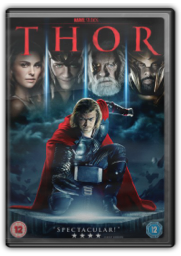
Of all the folks in long underwear to be tapped for superhero films, Thor would seem to be the most problematic to properly pull off. (Hypothetical Hollywood conversation: "A guy in a tricked-out, easily merchandisable metal suit? Great! An Asgardian God of Thunder who says stuff like thee and thou? Um, is Moon Knight available?") Thankfully, the resulting film does its source material rather proud, via a committed cast and an approach that doesn't shy away from the over-the-top superheroics. When you're dealing with a flying guy wielding a huge hammer, gritty realism can be overrated, really. Blending elements from the celebrated comic arcs by Walter Simonson and J. Michael Straczynski, the story follows the headstrong Thunder God (Chris Hemsworth) as he is banished to Earth and stripped of his powers by his father Odin (Anthony Hopkins) after inadvertently starting a war with a planet of ticked-off Frost Giants. As his traitorous brother Loki (the terrific Tom Hiddleston) schemes in the wings, Thor must redeem himself and save the universe, with the aid of a beautiful scientist (Natalie Portman). Although director Kenneth Branagh certainly doesn't skimp on the in-jokes and fan-pleasing continuity references (be prepared to stick around after the credits, Marvel fans), his film distinguishes itself by adopting a larger-than-life cosmic Shakespearean air that sets itself apart from both the cerebral, grounded style made fashionable by The Dark Knight and the loose-limbed Rat Packish vibe of the Iron Man series. Glorying in the absolute unreality of its premise, Branagh's film is a swooping, Jack Kirby-inspired saga that brings the big-budget grins on a consistent basis, as well as tying in with the superhero battle royale The Avengers. —Andrew Wright 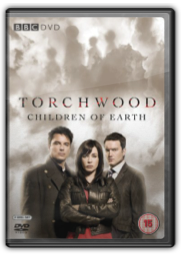
Even those who previously were alien to the charms of Torchwood, the ‘adult’ Doctor Who spin off, were left applauding by the end of 2009’s five-episode serial, Torchwood: Children Of Earth. For this was ‘adult’ in a good sense: no cheap swearing, no sex and violence for the sake of it. Rather, a challenging, thumping good tale for grown-ups, superbly told. 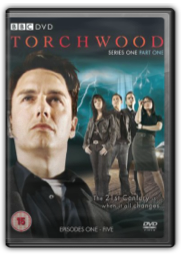
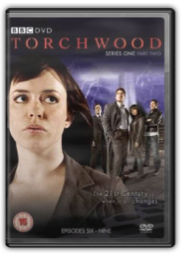
There are many reasons why Torchwood is unlikely to ever match the appeal of its parent show, Doctor Who, and this collection of episodes from its maiden series ably demonstrates why. 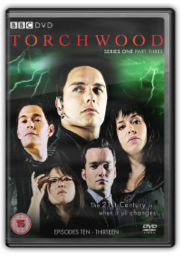

In many ways a far more experimental and variable series than the show it spun out of, Torchwood demonstrates many of the qualities of Doctor Who, but has certainly developed a tone all of its own. |

Ben Giles
Collection Total:
201 Items
201 Items
Last Updated:
Dec 9, 2011
Dec 9, 2011

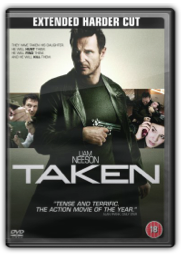
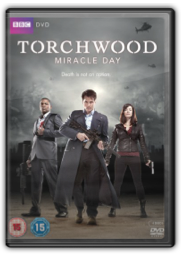
 Made with Delicious Library
Made with Delicious Library